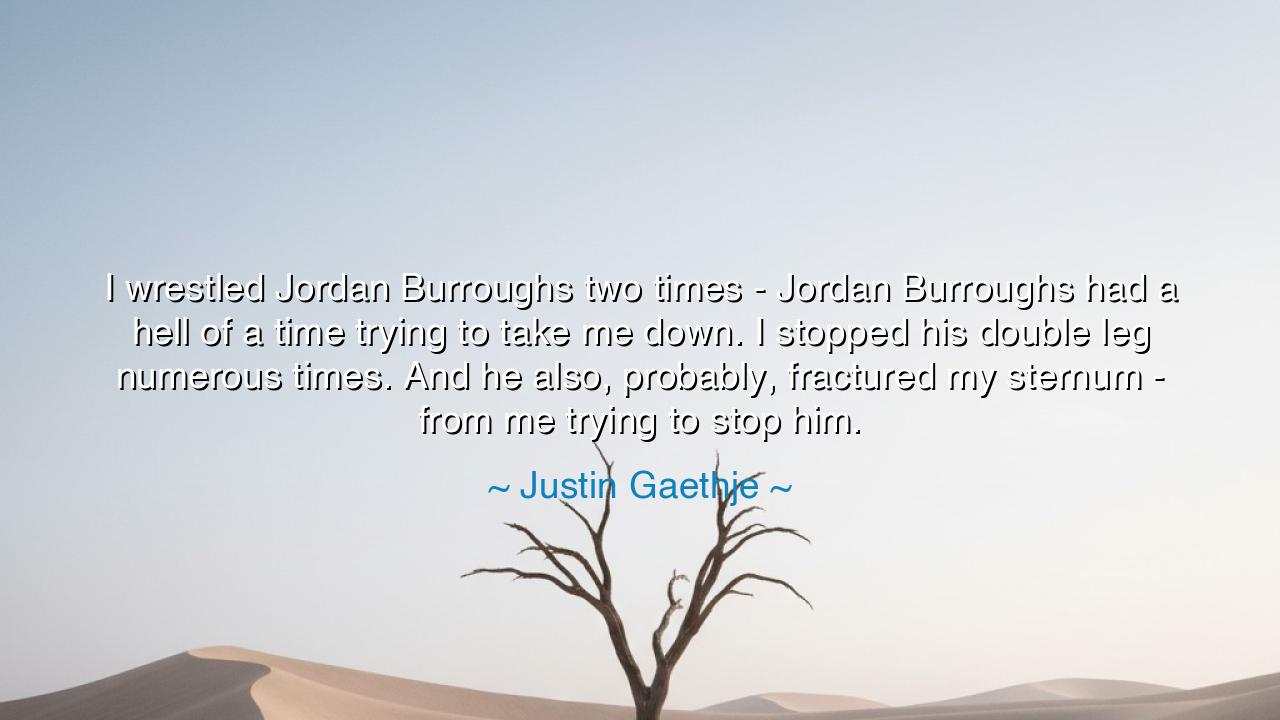
I wrestled Jordan Burroughs two times - Jordan Burroughs had a
I wrestled Jordan Burroughs two times - Jordan Burroughs had a hell of a time trying to take me down. I stopped his double leg numerous times. And he also, probably, fractured my sternum - from me trying to stop him.






Hear the fierce words of Justin Gaethje, who declared: “I wrestled Jordan Burroughs two times—Jordan Burroughs had a hell of a time trying to take me down. I stopped his double leg numerous times. And he also, probably, fractured my sternum—from me trying to stop him.” At first, this is but the tale of two warriors clashing in the arena of wrestling. Yet beneath the grit and the pain lies a deeper truth: that struggle against the greatest tests not only skill, but spirit; and that even in pain, there is honor in resistance.
For to face Jordan Burroughs, an Olympic champion and a legend of the mat, is to stand against a storm. To stop his double leg, feared across the world, is to defy inevitability itself. Gaethje recalls with pride that he resisted, that he endured, that he forced the great champion into difficulty. But the price of resistance was heavy: a fractured sternum, a body broken even as the will held fast. This is the paradox of struggle—victory and pain woven tightly together, each inseparable from the other.
The ancients understood this deeply. Consider the tale of Hector and Achilles upon the plains of Troy. Hector, knowing Achilles’ strength surpassed his own, still chose to stand and fight. Though the battle ended in death, Hector’s courage became eternal, remembered as much as Achilles’ triumph. So too with Gaethje’s words: it is not merely about Burroughs’ power, but about the glory of resistance, about standing unyielding even when the cost is pain.
There is also a teaching here about the cost of defense. To resist the unstoppable force is not without consequence. Gaethje’s fractured sternum is not shame, but testament. It proves that resistance has weight, that true opposition demands sacrifice. Many wish to stand against giants, but few are willing to pay the price in broken bodies and scarred spirits. His tale reminds us that greatness often leaves marks upon us—not only trophies, but wounds that speak of battles endured.
And yet, there is victory even in defeat. For Burroughs may have pressed forward, but Gaethje proved he could not be easily conquered. The measure of a man is not only in whether he triumphs, but in whether he makes even the mighty struggle to prevail. This is the essence of competition, of life itself: to stand, to resist, to fight so fiercely that even when you fall, you fall as one worthy of remembrance.
We may see this also in history’s David and Goliath. David struck the giant down, yes—but the deeper lesson is not only in the stone that flew true, but in the courage to step forth at all, when all others quailed. Gaethje’s story belongs to the same lineage: whether victory or loss, the act of facing greatness, and enduring its force, is itself a kind of triumph.
Thus the teaching is this: seek out the strongest adversaries, the most daunting challenges, for they will carve your character in ways ease never can. Do not fear pain, for pain is the proof that you stood your ground. Do not measure success only in wins, but in the depth of resistance you gave, the fire with which you endured. For even a fractured sternum may be a crown, if it tells the world that you did not bow before power.
So let your action be this: do not shrink from the mighty. Wrestle with them—whether in sport, in life, or in the struggles of the spirit. Stand firm, even if you are broken in the attempt. For the scars of such resistance will be your honor, and your story will live as a testament to courage. As Gaethje’s words remind us, the true glory is not in avoiding pain, but in daring to resist the unstoppable, and proving, if only for a moment, that even giants can be slowed.






AAdministratorAdministrator
Welcome, honored guests. Please leave a comment, we will respond soon